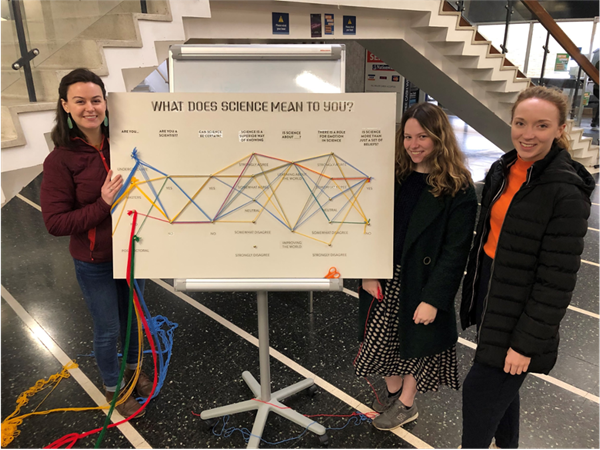Published: 16 Apr 2021
Category:

I joined the publications team at the British Pharmacological Society in early 2017 as I was interested in the process of publishing academic journals as an avenue for communicating science. I began to review how the research published in the Society’s journals was being disseminated and looked at how we could enhance what we were already doing. In 2018, I was excited to expand my role and became staff lead (aka managing editor) of the Society’s magazine, Pharmacology Matters, as another outlet for communicating the Society’s varied activities.
The Society’s publications are far from the only ways we communicate science, though. The publications team sits within the Research Dissemination directorate. This directorate is also home to the Meetings and Events team, who work hard to give scientists opportunities to learn from one another and network at our events. It also encompasses the Marketing and Communications team, who sit between all teams, helping us all to share messages effectively, primarily through our various digital channels. Beyond the Research Dissemination team, the Society is also involved in a wide variety of public engagement and outreach activities. Through our policy work, we also help to ensure that scientific expertise and advice is taken into account in decision making.
I decided to apply to the Science Communication MSc at Imperial College in 2019 to explore a more holistic view of science communication and the role of organisations like ours in wider society. Having studied a science degree at a university dominated by the natural sciences and engineering, I was intrigued by the challenge of a social science degree. Contrary to how I’d previously been taught, this style of learning encouraged critical thinking and discussion and there was a real focus on how to effectively convey your opinion.
When applying to the MSc course, I had envisaged it as a masterclass in the tools commonly used to communicate science ‘from’ scientists ‘to’ the public. I had a fairly narrow, hierarchical, one-way view of ‘communication’, and I had imagined that I would emerge from the degree with the ability to use a variety of techniques to package science to make it more accessible and interesting to ‘the public’. This is indeed a large part of what I took away from the course, but my idea of my role and the role of scientists changed a great deal over my time on the course, and I will go on to talk about three of my key takeaways.
Communication is inherently multi-way

It is easy to see the value in making research accessible to ‘the public’, for instance by making papers Open Access, using engaging methods of communication and making language accessible. But one of the main concepts we explored during the course was that this typical view of science communication as a one-way transfer of information does not actually represent ‘communication’ in its fullest sense. To embody the term ‘science communication’ more fully, there would need to be a multi-way dialogue, beginning during the setting of agendas for scientific research.
Just as with experts in any field, the role of scientific experts is crucial, and through the course I became interested in the relationship between deeper public participation and scientific expertise. This was a thread I continued to pull through my thesis, where I used a case study of an engagement project where scientists and members of the public worked together, using their individual experiences and skills, to collectively solve problems or answer questions.
Audience is key

This may sound obvious, but nothing happens in a vacuum, and this also applies to the relationship between science and ‘the public’. Each person viewing your research – in whatever form you present it – will arrive with their own unique life experiences of STEM, which will dictate how they respond to it. When considering opportunities for communicating your research it is always worth bearing this in mind, but this requires you to know your audience. When considering how to share you work, some questions you might ask yourself are:
- Who do you think should know about your research?
- Who do you think is likely to be interested in your research?
- Who are the audience of the communication channels and mediums you have available?
When you have a picture of your intended audience, then ask yourself:
- Why are you trying to reach this audience? What is the purpose of your communication?
- What is the relevance of your research to the lives of the people you are trying to reach?
- What level of scientific understanding might they have, and how might this change how you communicate with them?
Science is shaped by society

Science is how we create knowledge as we collect evidence using the tools we have available at the time to better understand how the universe works. The scientific method and assumption of objectivity can lead to a perception that science is a superior way of creating knowledge, which separates it from other fields and wider society.
However, this separation between science and society does not fit with our real-life experiences, as scientific research is a product of the place, time and social contexts it arose within. Recognising and celebrating these connections can be valuable, and a more holistic view of science could help us to understand issues such as how historical inequalities arise in scientific fields, so that we can begin to address them. And exploring the connections between science and the arts, for instance, could help to bring in new ways of thinking and problem solving.
Under the shadow of the COVID-19 pandemic, the Society’s role in science communication is arguably more important than it has ever been. Right now, it is important that we vaccinate and therefore protect as many people as possible, and when we come across those with different views to our own, we must be compassionate. If someone is hesitant about having a vaccine and this comes from a place of deep-seated distrust or concern, although providing well-communicated information is extremely important, it may not be enough to convince them. Instead, we need to hear and accept concerns and emotional responses as valid and consider how to address their roots.
If anyone would like to talk more about any of the topics I’ve raised, I’d love to hear your opinions and ideas. Feel free to leave a comment below or send me an email.
Comments
If you are a British Pharmacological Society member, please
sign in to post comments.